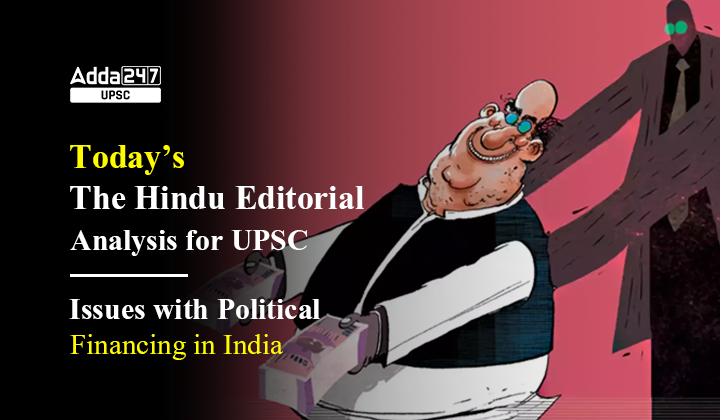Table of Contents
Why the issue of Political Financing is significant for UPSC?
Political financing is something which determines political competition in the country and it is something which has to be flawless as in the end political financing instruments like Electoral Bonds play a crucial role in forming governments also. So, issues pertaining to Political Financing need constant attention of a UPSC CSE aspirant.
If we take the syllabus, Political Financing covers GS 2: Structure, organization and functioning of the Executive and the Judiciary—Ministries and Departments of the Government.
Why Political Financing is in news?
- Political Financing is in news recently, because, the 23rd tranche of electoral bonds had been opened for sale from November 09 till the 15th of this month.
- State Bank of India was authorized to issue and encash Electoral Bonds through its 29 authorized branches.
- The last tranche of electoral bond sales were made between October 1-10, 2022.
Issues with Political Financing through Electoral Bonds
Anonymity
- When political parties get Political Financing through Electoral Bonds, neither the donor nor the political party is mandated to reveal the name of the donor. This secrecy might lead to entry of black money in the electoral process.
Control Over usage
- There is no mechanism to check the usage of these bonds, the court has even asked the government whether there is any control over how these donations were used by political parties.
More bonds to ruling party
Ever since the electoral bonds came in, most of the electoral bonds went in favour of ruling party. While the reason could be just, the chances of misuse of electoral bonds for vested interest cannot be ignored.
Possibility of Money Laundering
The electoral bonds ended all the safeguard that were present in corporate donations to Political parties through Companies Act. As, Indian, foreign and even shell companies donate to political parties without any need to inform anyone about the contribution.
Question on procedure followed
The scheme was brought in through amendments to finance bill as the government did not have majority in the Rajya Sabha. It was criticised for bypassing the parliamentary provisions
Political finance and political competition
The nature of political finance is an important determinant of the structure of political competition. let’s see how:
What is political competition?
The structure of political competition can be studied around three axes: institutional (the regulation of competition between ruling and Opposition parties); organisational (the regulation of competition within a party); and ideological (the role of ideas in determining competition between parties).
How the nature of political finance influences political competition?
- All the three axes of political competition are substantially influenced by the nature of political finance.
- One, the degree of transparency of political funding informs the efficacy of institutional safeguards. For example, the inherent opacity of electoral bonds renders the power of the Election Commission of India (ECI) irrelevant in terms of ensuring a levelplaying field. Meanwhile, the information asymmetry between the ruling and the Opposition parties gnaws at the fairness of electoral processes.
- Second, the extent to which political funding is centralised within a party determines whether power in the party is drawn from organisational structures or exercised in a personalistic manner.
- Third, the political financing regime also shapes the role of ideas in grounding political competition.
Do Political Financing through electoral bonds impact political competition?
According to critics of Political Financing through electoral bonds, electoral bonds impact overall political competition in the country in a negative way. According to them:
- Within two years of its introduction, electoral bonds were said to cover 52% of the total income of national parties and 53% of the total income of regional parties, according to an analysis by the Association for Democratic Reforms (ADR).
- According to them the design of electoral bonds, perhaps more than any other instrument of political finance, leans to the advantage of the ruling party.
- Electoral bonds invert the concept of transparency and openness in political funding, whereby only the government, and presumably the ruling party, have access to the transaction trails.
- Political Financing through electoral bonds centralises political funding towards the national units of political parties, further entrenching the leverage of national leadership over the State and local units.
- Out of the ₹5,851 crore of electoral bonds sold in 2018-19, 80% of the bonds were redeemed in Delhi.
- Electoral bonds were introduced alongside significant legal amendments, such as the removal of erstwhile limits (7.5% of net profit) on corporate donations. These changes in the legal architecture of political finance enable the prospects of an alliance of national political elite and big business conglomerates squeezing the space for both local elites and regional capital.
The controversial history of political financing in the Indira Gandhi Regime
- Indira Gandhi banned corporate donations in 1969 in order to limit the growth of the Swatantra Party and the Jana Sangh, who she feared were increasingly attracting corporate backers.
- These changes in political funding melded well with her wider strategy of tightening the grip of the state (and hence the ruling party) over big business through the project of dialling up licence/controls and nationalisation of key industries.
- At the same time, the Indira Gandhi regime also cultivated personalistic relationships with big business elites in order to marginalise the regional strongmen which had till then controlled the organisational structure of the Congress party.
What are the key provisions of the electoral bond scheme 2018?
|
FAQs on the issues of Political Financing in India
Q. Who can purchase electoral bonds in India?
Ans. The provisions of the Electoral Bond Scheme 2018 mandate, electoral bonds may be purchased by a person, who is a citizen of India or incorporated or established in India.
Q. Why Indira Gandhi banned corporate donations?
Ans. Indira Gandhi banned corporate donations in 1969 in order to limit the growth of the Swatantra Party and the Jana Sangh, who she feared were increasingly attracting corporate backers.
Q. Who can receive electoral bonds?
Ans. Only the political parties registered under Section 29A of the Representation of the People Act, 1951 (43 of 1951) and which secured not less than one percent of the votes polled in the last general election to the house of the people or the legislative assembly of the state, shall be eligible to receive the electoral bonds.




 TSPSC Group 1 Question Paper 2024, Downl...
TSPSC Group 1 Question Paper 2024, Downl...
 TSPSC Group 1 Answer key 2024 Out, Downl...
TSPSC Group 1 Answer key 2024 Out, Downl...
 UPSC Prelims 2024 Question Paper, Downlo...
UPSC Prelims 2024 Question Paper, Downlo...





